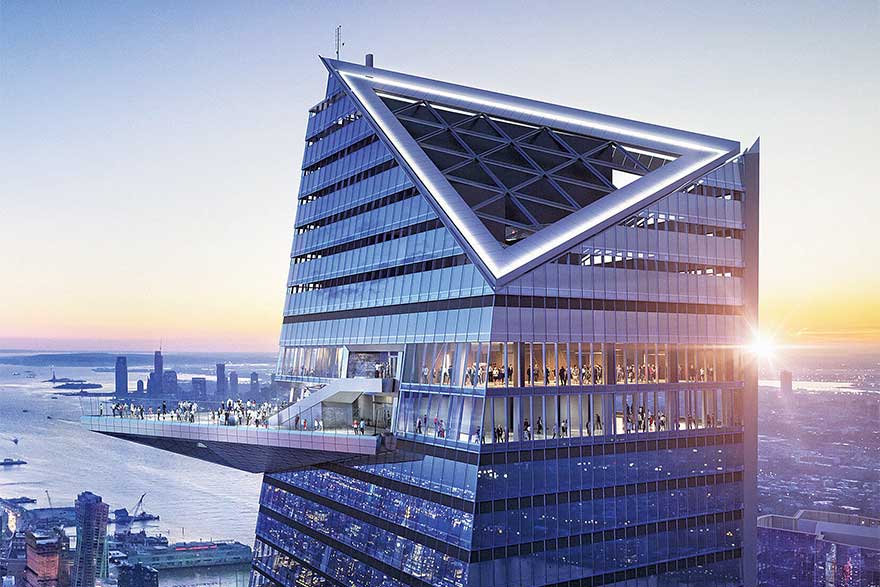The health and technological advancement of every industry is best showcased through its end products. Completed technologically advanced buildings and the efficiency of their subsequent use are great learning tools that allow architects to push the boundaries in material development, fabrication, sustainability and interactive design.
TodIt’s a sad truth, but most of us spend our work days in terribly uninspiring environments. Those fluorescent panels, cookie cutter cubicles and motivational posters may be soulless, but design sensibility often carries a premium that is slashed from the bottom line of Big Business. There are some progressive companies, however, who push the envelope of design to provide their employees with a truly invigorating work environment.
Here’s a list of some of the world’s most technologically advanced buildings that push the envelope when it comes to responsiveness, well-being, sustainability and construction costs.
THE EDGE
By PLP Architecture
Described as the world’s greenest, most intelligent building, Deloitte’s new Amsterdam head office, the Edge, has received the highest sustainability score ever awarded by the British rating agency BREEAM. The building, designed by PLP Architecture, uses technology to achieve an unprecedented level of resource efficiency, but also create a collaborative work environment in tune with its users. Its LED panels pack about 28,000 sensors that track motion, light, temperature and humidity, creating a unique artificial neural network.
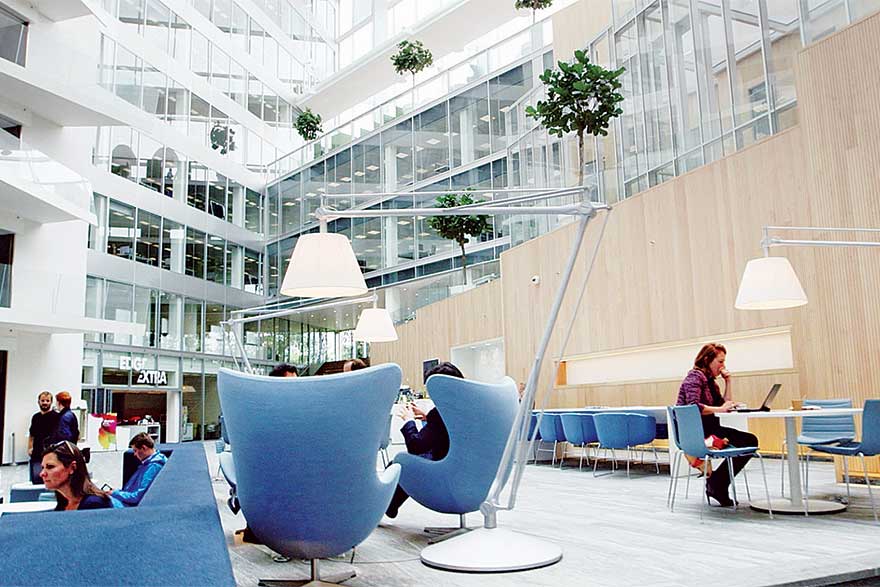
Surprisingly, the building comprises only 1,000 desks. The concept of hot desking–using desks only when they’re needed– increases occupancy efficiency and boosts productivity. The rest of the spaces designated for work are informal meeting spaces and lounge areas.
TAIPEI 101 TOWER
By C.Y. Lee & Partners
Named for its 101 floors, Taipei 101 held the record as the world’s highest building for six years after its completion in 2004. Its sustainable construction has also made it the world’s tallest green building. The building received LEED Platinum Certification in 2012 and has some of the most advanced disaster prevention features ever built. Taiwan is heavily affected by typhoons, which makes building tall buildings a tricky business, to say the least.
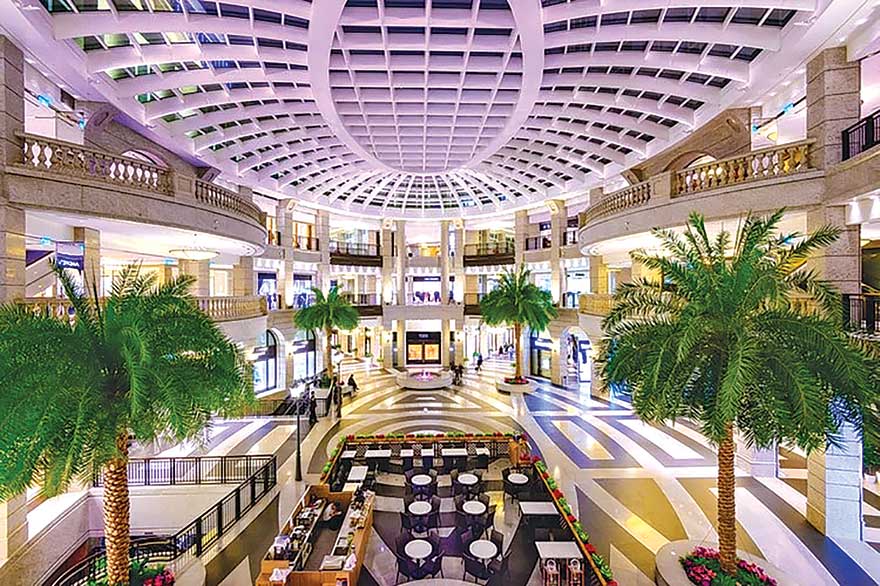
Massive storms hit the East Asian coastline each year, bringing wind and rainfall strong enough to take down entire buildings. Taipei 101 tackles this with unprecedented inventiveness. The building’s most notable engineering feature is its tuned mass damper. This element functions as a large pendulum that counterbalances the sway of the building by swinging in the opposite way on hydraulically controlled suspension cables. This movement is controlled and reacts precisely to the movement of the building.
APPLE CAMPUS 2, CUPERTINO
By Foster+Partners
Apple’s new spaceship-shaped campus in Cupertino, California, has been a hot topic of debate in the AEC community ever since the release of its first images. The heavilypublicized project has a ring-shaped layout enveloping a patch of greenery. It is outfitted with solar panels and will be powered mainly by an “on-site low carbon Central Plant”.
Foster+Partners included a 9,290 square meters fitness center, 27,870 square meters of research and development facilities, and two miles of walkways and running paths for employees, underground parking, as well as an orchard, meadow and pond. The staff can also navigate the campus on bikes, electric golf carts and commuter shuttles. The building will feature the world’s largest panels of curved glass which will limit glare and provide views of the outdoors from any location inside.
BULLITT CENTER
By Miller Hull
The Bullitt Center in Seattle features several systems that make it one-of-a-kind and justify its status of the world’s greenest commercial building. A third of the building’s roof is covered in photovoltaic panels that produce around 230,000 kilowatt-hours per year. Rainwater is collected in a 255,000 litres cistern and reused throughout the building. It features composting toilets and none of the 350 common toxic chemicals, including PVC, lead, mercury and BPA.
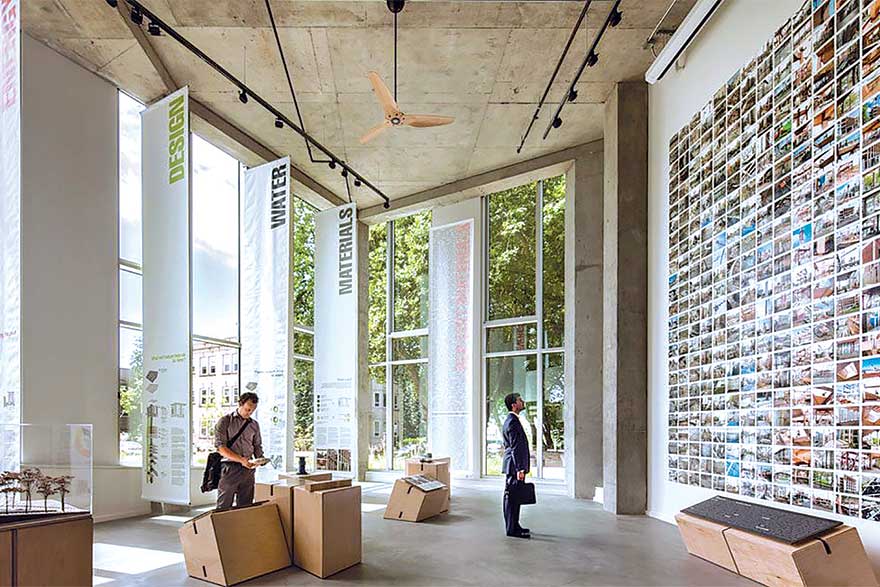
All systems are monitored and the real-time measurements of indoor air quality, energy consumption and photovoltaic power production are available to visitors. One of the most prominent features of the building is the fact that these innovative engineering solutions are visible and celebrated through the building’s architectural style.
POWERHOUSE KJØRBO
By Snohetta
Norwegian architecture firm Snohetta undertook a renovation of an existing 1980s building in Bærum, just outside Oslo, and transformed it into the world’s first “energy positive building” (EPB) or “net positive” building. The 200,000 kWh of on-site photovoltaics produce twice as much energy required to meet the needs of the building.
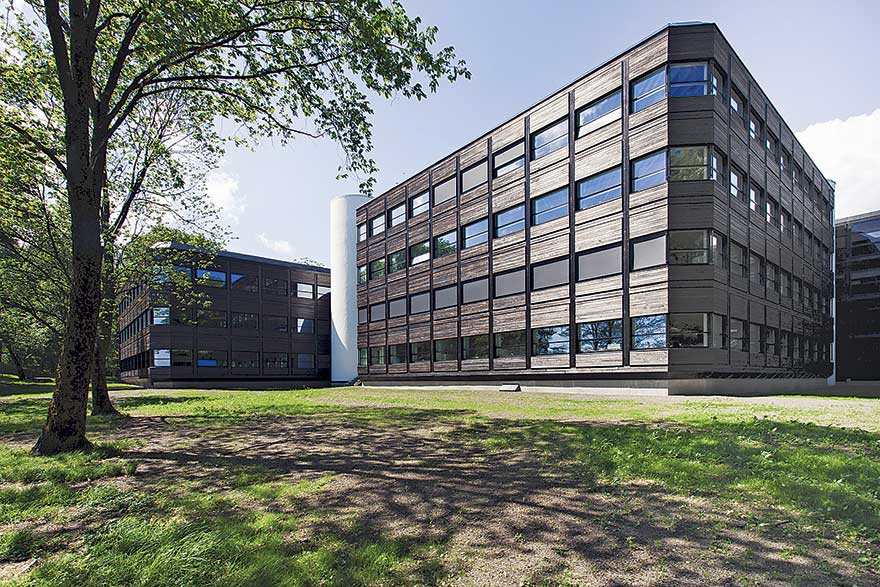
According to predictions, the building will generate enough power in the next 60 years to cover the total amount of energy used to manufacture all the building materials, as well the construction, operation and waste disposal. This is something that is often omitted when considering energy efficiency of contemporary buildings that strive for sustainable performance.
TEN THOUSAND
By Handel Architects
Ten Thousand Santa Monica is a 283-unit, 71,278 square meters residential tower in Los Angeles comprising four crystalline masses topped with a dramatic angled roof. The building offers an amazing array of techinfused amenities, including a relay delivery robot named CHARLEY programmed to navigate the building, deliver packages, meals, drinks, etc.
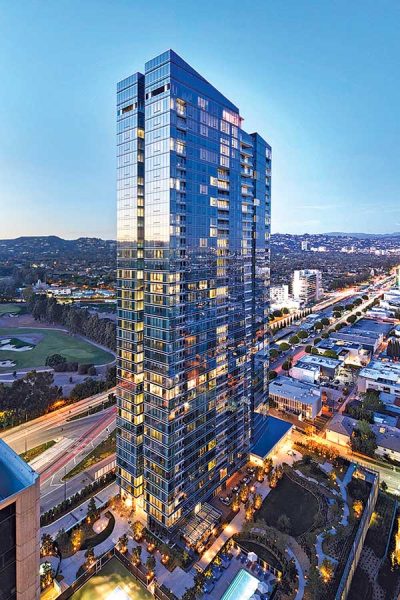
Each resident has an iPad mini that features the Ten Thousand app. They can access the main menu and choose the item to be delivered by CHARLEY. Besides providing connection to the delivery robot, the app also integrates a beacon technology system throughout the building that predicts the residents’ needs. The residents can also use the app-based valet system to pay for training sessions, drinks at the bar, reserve private dining rooms and event spaces, request vehicles, and pay rent.
NG TENG FONG GENERAL HOSPITAL
By HOK
The Ng Teng Fong General Hospital is a community college science building in Singapore that uses 38% less energy than a typical Singaporean hospital and 69% less than a typical U.S. hospital. Its design, conceived by HOK, is based on passive sustainability principles aided by several active systems that curb its carbon emissions and power consumption. It is rare for buildings of this type to achieve net zero energy.
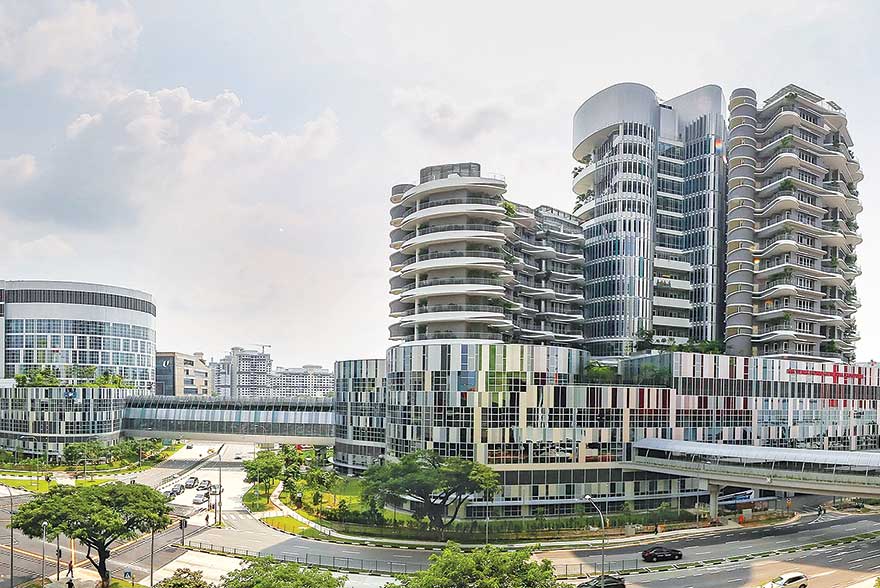
The hospital also is the first medical campus to combine continuing care from outpatient to post-acute care in Singapore. Its focus on patient well-being was the driving force behind many of its features, including its heavy reliance on natural ventilation and the presence of vegetation throughout the campus.
SACRAMENTO KINGS’ GOLDEN 1 CENTER
By AECOM
The solar-powered Sacramento Kings’ Golden 1 Center by AECOM is the first arena of its size to use a displacement ventilation system that directs fresh air upward from floor openings under the seating, instead of pumping forced air down into the arena from overhead diffusers. This kind of ventilation allows for cooling only the space around people instead of the entire building, which makes it more efficient and flexible compared to other ventilation systems. This means that the arena maintains stable temperatures at all times and during both hot and cold-weather sporting events.
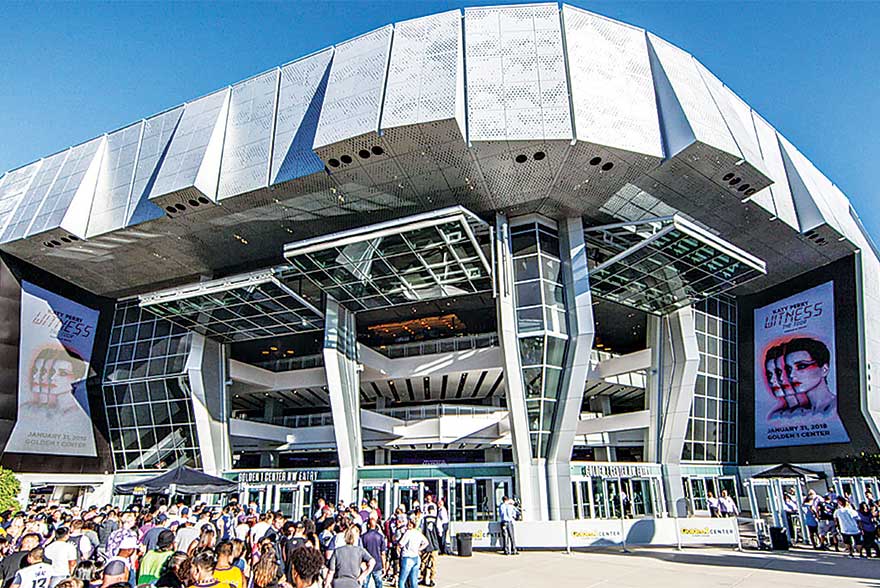
There is no need to pre-cool the building, so the building can host two events on the same day. Furthermore, the air conditioning can be crowd-sourced, which means that the audience can use an in-game app to mark whether they’re too hot or cold in real time. The arena is the first to receive approval for the use of this kind of technology, and the first LEED Platinum–certified NBA arena expected to curb its carbon emissions by 24 percent compared to its predecessor–the Sleep Train Arena. The structure is powered entirely by a 1.2-megawatt solar array installed on its roof surface, and an 11-megawatt solar farm located 40 miles away.
BAHRAIN WORLD TRADE CENTER
By Atkins
The 50-story Bahrain World Trade Center (BWTC), known as the country’s first ‘intelligent’ building with integrated SMART IT systems, boasts a unique feature – 3 huge wind turbines tying its two sail-shaped volumes together. The 29 meter wind turbines, each supported by a 30-meter bridge spanning between the two towers funnel and accelerate the wind going in-between the sails. The building is the first building in the world to incorporate this type of technology–and at this large a scale– into its design.
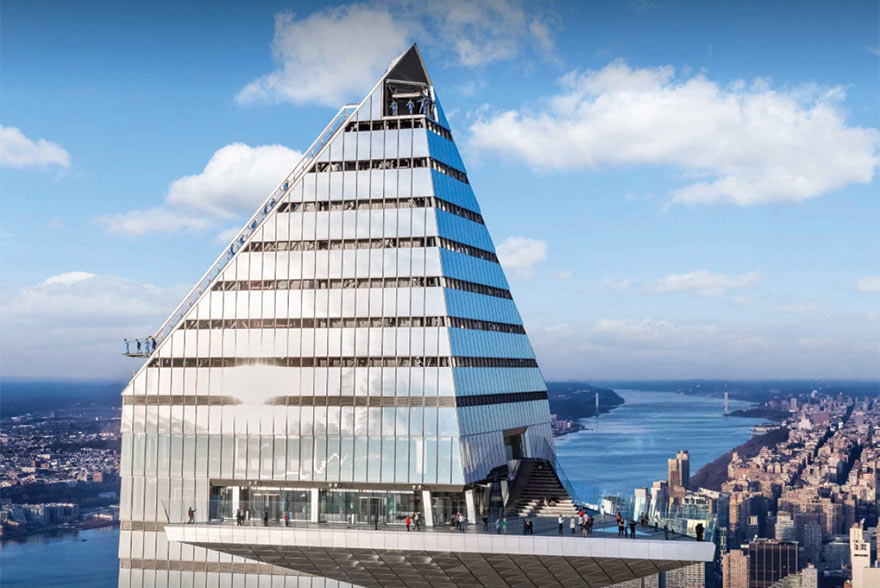
The development also incorporates the use of heat recovery systems, variable-volume chilled water pumps, energy efficient fluorescent lighting, solar-powered roads and amenity lighting, as well as reflective pools at the entrances which provide local evaporative cooling.
IBM WATSON IOT HQ
By Universal Design Studio
IBM’s new headquarters in Munich is the company’s largest investment ever in Europe, and will serve as a research hub for artificial intelligence, the Internet of Things and Blockchain, among other things. The building, designed by Universal Design Studio, will gather software engineers, programmers, architects, designers, cognitive scientists, researchers and clients working together to bring cognitive computing to IoT. Distributed across more than 25 floors, collaborative spaces will be equipped with IoT devices, occupancy sensors, and voice activation automated interfaces.
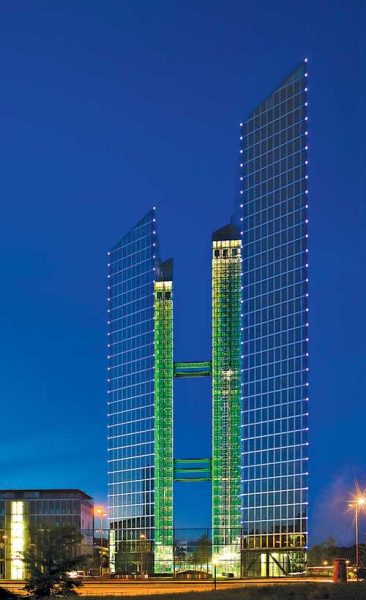
As one of the most technologically advanced buildings it can automatically adjust temperature and lighting to users’ preferences, and detect free spots which enables hot-desking. Server rooms are left visible to show the technology driving the experiences communicating transparency and openness.
